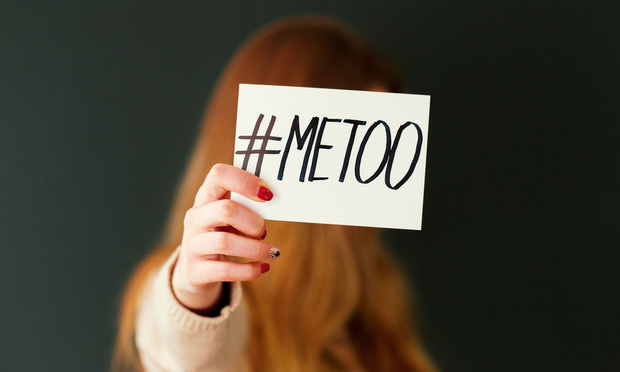The #MeToo Backlash Is Building
One year later, with male/female workplace relationships in an awkward phase, women are feeling the fallout.
October 26, 2018 at 03:44 PM
4 minute read
The original version of this story was published on The American Lawyer

Maybe it was inevitable that the #MeToo movement would come back to bite women.
On one hand, women seem more powerful than ever. It's not just mighty titans like Harvey Weinstein or Les Moonves who've fallen because of allegations of sexual harassment, but hardworking stiffs of the legal profession like former Mayer Brown partner James Tanenbaum and that mystery partner from Baker McKenzie's London office (whose identity most of us know), among others.
 The fallout is that some male lawyers are so fearful of being tainted with sexual harassment charges that they're running for the hills, dodging close working relationships with women. They might not be as blatant as Mike Pence about avoiding female company (he never eats alone with a woman other than his wife, nor does he go to events that serve alcohol without her), but they're drawing a line, nonetheless.
The fallout is that some male lawyers are so fearful of being tainted with sexual harassment charges that they're running for the hills, dodging close working relationships with women. They might not be as blatant as Mike Pence about avoiding female company (he never eats alone with a woman other than his wife, nor does he go to events that serve alcohol without her), but they're drawing a line, nonetheless.
“It's a genuine fear,” says a young female partner at an Am Law 100 firm in New York. “I've talked to men—well-meaning ones—who say they're scared of being taken the wrong way by women, who don't know how they should interact with female associates and colleagues. I'm afraid this will mean men will exclude us even more from relationship-building opportunities. If there's a case that entails travel, they might think it's safer to pick a male colleague than me.”
Women have reason to worry that they might be excluded. According to a survey by Working Mother and ABA Journal released this year, most men (56 percent) are nervous about one-on-one interactions with women at work and the charges of impropriety that might result. One male leader told the authors of the survey, “One allegation can be a career killer,” adding, “I will not be alone in the office with any female—whether she is a colleague or a support-staff member. This is to protect myself.”
That kind of attitude certainly won't help women gain high-profile assignments or critical sponsorship when men are still the ones in control. It's also an abdication of a leader's responsibility, says diversity consultant Jennifer Brown.
“If people in power are too afraid because of the headlines and the scrutiny, that's a problem,” she says. “It's their job to integrate those who are not well-represented.”
Brown suggests that the male manager ask women what would be a comfortable format for one-on-one work, instead of requiring them to set the boundaries.
“The onus shouldn't be on those who are in a marginalized position,” Brown says.
It's clear that male/female relationships at work are in an awkward phase.
“I am seeing a hypersensitivity among young women attorneys to behavior which, while not necessarily great, does not rise to the level of sexual harassment,” says career coach Ellen Ostrow.
She cites two examples: A male partner who touches the arm of a female associate for doing a great job, and a male senior counsel who compliments the blouse of a female lawyer. In both cases, the women complained.
“There's a blurring of what constitutes gender bias and what is harassment,” Ostrow says.
Many women don't buy the idea that men are in a bind.
“Some men are using it as an excuse not to sponsor or meet with women alone,” says Joan Williams, professor at University of California, Hastings College of the Law.
“It's a bunch of crap that men don't know what to do now,” says a senior female counsel at a large bank. “They're trying to be cute, like, 'Oh, women are so touchy, they'll get offended about anything.'”
Call it the #MeToo backlash or the Pence effect. Any way you look at it, it's another reason women are still stuck.
Contact Vivia Chen at [email protected].
This content has been archived. It is available through our partners, LexisNexis® and Bloomberg Law.
To view this content, please continue to their sites.
Not a Lexis Subscriber?
Subscribe Now
Not a Bloomberg Law Subscriber?
Subscribe Now
NOT FOR REPRINT
© 2025 ALM Global, LLC, All Rights Reserved. Request academic re-use from www.copyright.com. All other uses, submit a request to [email protected]. For more information visit Asset & Logo Licensing.
You Might Like
View All
Law Firms Look to Gen Z for AI Skills, as 'Data Becomes the Oil of Legal'

Law Firms Expand Scope of Immigration Expertise Amid Blitz of Trump Orders
6 minute read
Latest Boutique Combination in Florida Continues Am Law 200 Merger Activity
3 minute read
Incoming Howard University Law Professor Kiah Duggins Among DC Plane Crash Victims
Trending Stories
- 1Uber Files RICO Suit Against Plaintiff-Side Firms Alleging Fraudulent Injury Claims
- 2The Law Firm Disrupted: Scrutinizing the Elephant More Than the Mouse
- 3Inherent Diminished Value Damages Unavailable to 3rd-Party Claimants, Court Says
- 4Pa. Defense Firm Sued by Client Over Ex-Eagles Player's $43.5M Med Mal Win
- 5Losses Mount at Morris Manning, but Departing Ex-Chair Stays Bullish About His Old Firm's Future
Who Got The Work
J. Brugh Lower of Gibbons has entered an appearance for industrial equipment supplier Devco Corporation in a pending trademark infringement lawsuit. The suit, accusing the defendant of selling knock-off Graco products, was filed Dec. 18 in New Jersey District Court by Rivkin Radler on behalf of Graco Inc. and Graco Minnesota. The case, assigned to U.S. District Judge Zahid N. Quraishi, is 3:24-cv-11294, Graco Inc. et al v. Devco Corporation.
Who Got The Work
Rebecca Maller-Stein and Kent A. Yalowitz of Arnold & Porter Kaye Scholer have entered their appearances for Hanaco Venture Capital and its executives, Lior Prosor and David Frankel, in a pending securities lawsuit. The action, filed on Dec. 24 in New York Southern District Court by Zell, Aron & Co. on behalf of Goldeneye Advisors, accuses the defendants of negligently and fraudulently managing the plaintiff's $1 million investment. The case, assigned to U.S. District Judge Vernon S. Broderick, is 1:24-cv-09918, Goldeneye Advisors, LLC v. Hanaco Venture Capital, Ltd. et al.
Who Got The Work
Attorneys from A&O Shearman has stepped in as defense counsel for Toronto-Dominion Bank and other defendants in a pending securities class action. The suit, filed Dec. 11 in New York Southern District Court by Bleichmar Fonti & Auld, accuses the defendants of concealing the bank's 'pervasive' deficiencies in regards to its compliance with the Bank Secrecy Act and the quality of its anti-money laundering controls. The case, assigned to U.S. District Judge Arun Subramanian, is 1:24-cv-09445, Gonzalez v. The Toronto-Dominion Bank et al.
Who Got The Work
Crown Castle International, a Pennsylvania company providing shared communications infrastructure, has turned to Luke D. Wolf of Gordon Rees Scully Mansukhani to fend off a pending breach-of-contract lawsuit. The court action, filed Nov. 25 in Michigan Eastern District Court by Hooper Hathaway PC on behalf of The Town Residences LLC, accuses Crown Castle of failing to transfer approximately $30,000 in utility payments from T-Mobile in breach of a roof-top lease and assignment agreement. The case, assigned to U.S. District Judge Susan K. Declercq, is 2:24-cv-13131, The Town Residences LLC v. T-Mobile US, Inc. et al.
Who Got The Work
Wilfred P. Coronato and Daniel M. Schwartz of McCarter & English have stepped in as defense counsel to Electrolux Home Products Inc. in a pending product liability lawsuit. The court action, filed Nov. 26 in New York Eastern District Court by Poulos Lopiccolo PC and Nagel Rice LLP on behalf of David Stern, alleges that the defendant's refrigerators’ drawers and shelving repeatedly break and fall apart within months after purchase. The case, assigned to U.S. District Judge Joan M. Azrack, is 2:24-cv-08204, Stern v. Electrolux Home Products, Inc.
Featured Firms
Law Offices of Gary Martin Hays & Associates, P.C.
(470) 294-1674
Law Offices of Mark E. Salomone
(857) 444-6468
Smith & Hassler
(713) 739-1250








